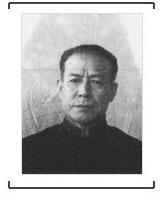Abstract of Nosuke Sasaki's confession
 0 Comment(s)
0 Comment(s) Print
Print E-mail China.org.cn, July 6, 2014
E-mail China.org.cn, July 6, 2014
 |
Nosuke Sasaki
According to the written confession of Nosuke Sasaki from August 1954 to May 1956, he was born in 1893 in Fukuoka Prefecture, Japan. In September 1932, he came to China to join the Japanese War of Aggression against China and served as major and battalion chief of the 3rd Brigade of the 63rd Infantry Regiment of the 10th Division of the Kwantung Army. In July 1945, he became lieutenant general and commander of the 39th Division of the 3rd Front Army of the Kwantung Army. On 23 August 1945, he was arrested by the Soviet Army.
Major offences:
October 1932: "during my garrison duty in Jiamusi", "about 30 Chinese people were arrested as spy suspects". "Among them, 15 soldiers and 6 civilians were killed after interrogation with torture." In a village 10 kilometers to the northeast of Jiamusi", "damage was made to people in the villages on the battlefield and 5 people were killed under my command";
August 1940: in Moganshan, Zhejiang, "the battalion under my command inflicted great damage to the soldiers of the Chongqing Army (i.e. the Kuomintang Army, note by the editor) by using poison gas (green colored canisters)". In October in Zhuji, Zhejiang, "about 600 soldiers of Chongqing Army were killed, and among them, 40 had been seriously wounded in combat or taken as captives. This crime was due to my daily instruction that the captives should be killed. All the battalions used poison gas (green colored canisters) in the battles to do great damage to the Chongqing Army soldiers";
January 1941: in Hangzhou, Zhejiang, the First Battalion under his command"arrested about 20 spy suspects and around 7 of them were killed after interrogation with torture"; the Second Battalion "arrested about 20 spy suspects and around 9 of them were killed after interrogation with torture"; and the Third Battalion "arrested about 25 spy suspects and around 8 of them were killed after interrogation with torture";
December 1943: in "Ambon Island, Dutch East Indies", " forced more than 10 Indonesian women to work in a comfort station to serve Japanese soldiers, which was a gross insult to the Indonesian women";
June 1944: in the battles from Jinhua to Quzhou, Zhejiang, "killed about 50 people";
From December 1944 to May 1945: in Hubei, "arrested about 90 spy suspects of the Anti-Japanese Army and anti-Japanese groups, killing about 30 of them through interrogation with torture", and "in the Propaganda Team of the Infantry Regiment, we made deceptive propaganda for the Chinese people, and maltreated them in practice , killing about 6 people". In Dangyang, Hubei, "for the majority of the people who rose in a just act against the aggression, about 20 of them were killed through beating and torture". "To teach Japanese soldiers how to use bayonets and swords, 5 captives were brutally killed". "When the Division is stationed in Hubei, an existing Japanese-run comfort station in Dangyang was used to serve the Japanese soldiers. The Division supported the operation of this comfort station. There were over ten Chinese women in the comfort station, who were subject to hardship by the war of aggression waged by the Japanese imperialists and forced to come here and work in this humiliating business. I think there were similar comfort stations in Yichang and Jingmen";
January 1945: in Dangyang, Hubei, "We killed around 5 captives". "When the Division gathered all the officers in Dangyang and conducted the poison gas training, 2 captives were sent to the gas chamber to test the gas effect. The Medical Department of the Division then put another 4 captives into the gas chamber for the gas effect test. All of them were eventually killed by the poison gas";
February 1945: "we killed about 15 innocent Chinese people" in Mashantun, to the northwest of Shashi, Hubei;
March 1945: during the battles in Xiangfan, Hubei, "killed about 3,500 soldiers of the Chongqing Army (including some captives)", "killed about 200 Chinese people", "raped approximately 50 Chinese women" and "burned down houses of about 200 households"; "In order to conceal the combat intention of the Division", "stopped 3 people from passing through and killed them, besides, on other village roads, arrested and tortured people, and killed over ten people"; "during the battles in Nanzhang, found 2 wounded soldiers of the Chongqing Army carried on stretchers by 4 Chinese people, then killed the two wounded soldiers and shot dead the 4 men when they tried to escape"; "during the battles, all infantry forces used poison gas and the artillery launched gas shells to cause damage to the Chongqing Army";
In addition:
From September to December 1932: "killing people: approximately 35 people in battles and 8 in normal times, totaling about 43";
From March 1934 to December 1934: "killing people: about 10 people";
From March 1936 to May 1937: "killing people: about 7 people";
From March 1940 to March 1941: "killing people: about 3 people in battles and 24 in normal times, totaling about 27"; "raping women: one woman in normal times";
From December 1942 to January 1944: "killing people: approximately 3 in battles and 21 in normal times (wounding about 15 in addition), totaling about 24"; "abused women (comfort station): more than 10 women";
From February to November 1944: "killing people: approximately 50 in battles; 2 in normal times"; "raping women: one woman";
From December 1944 to August 1945: "killing captives: approximately 6 in battles, about 5 in normal times for bayonet teaching, 6 for poison gas training and 5 for other purposes, totaling about 22"; "killing people: approximately 204 in battles" and "65 in normal times", "totaling about 269"; "raping women: about 50 (estimated figure) in battles" and "17 in normal times (including comfort station)", "totaling about 67".
(Source: The State Archives Administration of China)






Go to Forum >>0 Comment(s)